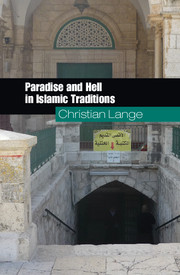Book contents
- Frontmatter
- Dedication
- Contents
- List of Figures
- List of Table and Charts
- Acknowledgements
- List of Abbreviations
- Note on Dates, Citation, Translations, and Transliteration
- Introduction
- Part I Textual Foundations: Narrating the Otherworld
- Part II Discourses and Practices: Debating the Otherworld
- 5 The Otherworld Contested: Cosmology, Soteriology, and Ontology in Sunni Theology and Philosophy
- 6 Otherworlds Apart: Shiʿi Visions of Paradise and Hell
- 7 The Otherworld Within: Paradise and Hell in Islamic Mysticism
- 8 Eschatology Now: Paradise and Hell in Muslim Topography, Architecture, and Ritual
- Epilogue
- Primary Sources
- Secondary Sources
- Index of Names
- Index of Terms
5 - The Otherworld Contested: Cosmology, Soteriology, and Ontology in Sunni Theology and Philosophy
from Part II - Discourses and Practices: Debating the Otherworld
Published online by Cambridge University Press: 05 December 2015
- Frontmatter
- Dedication
- Contents
- List of Figures
- List of Table and Charts
- Acknowledgements
- List of Abbreviations
- Note on Dates, Citation, Translations, and Transliteration
- Introduction
- Part I Textual Foundations: Narrating the Otherworld
- Part II Discourses and Practices: Debating the Otherworld
- 5 The Otherworld Contested: Cosmology, Soteriology, and Ontology in Sunni Theology and Philosophy
- 6 Otherworlds Apart: Shiʿi Visions of Paradise and Hell
- 7 The Otherworld Within: Paradise and Hell in Islamic Mysticism
- 8 Eschatology Now: Paradise and Hell in Muslim Topography, Architecture, and Ritual
- Epilogue
- Primary Sources
- Secondary Sources
- Index of Names
- Index of Terms
Summary
Theological thinking about the otherworld in Islam unfolded in three main areas: cosmology, soteriology, and ontology. That is to say, Muslim theologians debated how paradise and hell are situated in space and in time; they discussed the conditions for, and the various modalities of, salvation and damnation in the afterlife; and they sought to define in what sense the otherworld is “real,” whether it is spiritual or corporeal, or both, or something else altogether. While the first, cosmological tradition of theological thinking connects to mythic repertoires of picturing the otherworld, the second, soteriological one is rooted in the discipline of dialectic theology (kalām), the trading of arguments between different schools of thought. Finally, in their discussions of the ontological status of the otherworld, Muslim theologians came to interact with Islamic philosophy, or falsafa, which gave rise, in the later Middle Ages, to new philosophical-theological syntheses. The aim of this chapter is to trace each of these traditions of thought and in the process also critically put to the test three common – and in my view, not entirely correct – scholarly perceptions of Sunni theological eschatology: firstly, that it rigorously divorces the otherworld from earthly, ordinary space and time; secondly, that it unfailingly professes a high degree of salvation certainty; and thirdly, that it has a straightforward, materialistic conception of the otherworld.
The Location, Creation, and Duration of Paradise and Hell
In the early centuries of Islam, Muslim theologians disagreed as to whether paradise and hell were located on earth or in the otherworld. The question seems to have been somewhat less controversial with regard to hell. After all, the Qurʾān speaks of “seven earths” (65:12), while also describing hell as a trench or subterranean pit, a netherworld, divided into seven compartments. The standard notion, therefore, was that hell coincides with the subterranean layers of the earth, or that it is “inside the earth,” while being connected to the surface by a number of gateways, usually imagined as leading through deep wells. Exegetes commonly associated the mysterious sijjīn mentioned in the Qurʾān, a place in hell where “the record of the reprobates” is kept (Q 83:7–9), with a rock, situated in the lowest earth, on which the whole universe rests.
- Type
- Chapter
- Information
- Paradise and Hell in Islamic Traditions , pp. 165 - 191Publisher: Cambridge University PressPrint publication year: 2015



